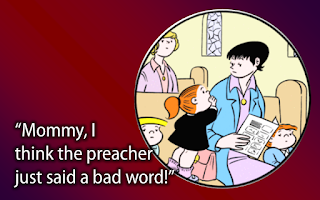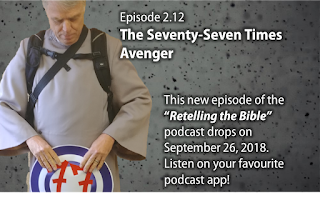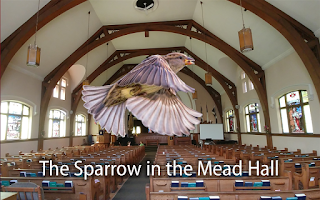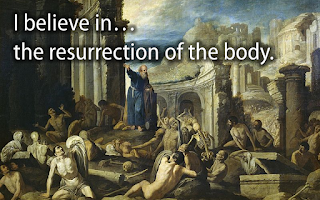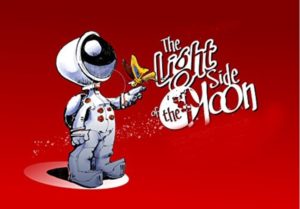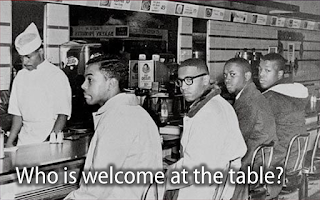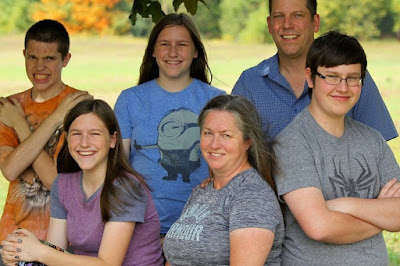Hespeler, 16 September, 2018 © Scott McAndless
Psalm 30:1-12, 1 Peter 3:18-22, Matthew 10:26-33
| M |
any years ago, I began my journey towards literacy by every day fighting with my brother and sisters over which one of us would be the first to get a hold on one particular page in the Toronto Daily Star: the comics page. Oh, it was glorious, an entire broadsheet covered with black and white comics. It was a great way to practice reading when there were lots of pictures and not too many words and hardly any big ones.
But there was one problem: I did know that the comics were supposed to be funny but I didn’t always get the joke. And I’m sure that there were times when my parents got pretty tired of me running to them and asking them to explain the joke. Like, for example I remember one very particular comic. It was the Family Circus, one of my favorites, and it showed the Keene family together in church one Sunday morning and one of the children, I believe it was Dolly, is whispering to her mother in the middle of the service. “Mommy,” she whispers, “I think the preacher just said a bad word.”
I didn’t get it. And I remember going to my mom and asking what bad word a preacher might have said. She thought for a moment and said that she figured that the preacher had probably said “hell.” Now, I’m not quite sure what the moral standards for swearing are around your workplace, I suspect that these days, saying “hell” is pretty tame in most places. But back in those innocent days, using that word could be shocking. But, of course, the exception was that you could talk about hell in the context of a sermon at church. That was the joke.
In some ways I think that the attitude has flipped today. No, it probably wouldn’t be a great big deal to hear somebody say, “What the hell,” or even, if it was said in fun, “go to hell,” today. But, in some ways, I think we’ve become less comfortable talking about Hell in church. According to some of the statistics that I have seen, most Christian still do believe in a Hell and still believe that some reprobate people will be sent there, but I really get the impression that none of us feels very comfortable talking about it for some very good reasons.
And I don’t think we’re the first. When the Christian faith first started, it started in a Jewish world that had some very established ideas about what happened to people after they died. The Jews, at that time, did not speak about Hell, which is an English word, they spoke about a place called Sheol. Now Sheol was not exactly the same thing as we think of as Hell. For one thing, they conceived of Sheol as a physical space hidden in the depths of the earth. It was the place where people went when they died but it wasn’t a place of punishment. Nor was it really a place of reward or bliss either. It just kind of was. It was an existence with no remembrance, where no one could speak and where, as we read in the Psalm this morning, you couldn’t even praise God. It was just kind of a dry, bland holding place.
Now, because of what they had experienced in Jesus Christ – because they had experienced the living resurrected presence of Jesus among them after he had died – the early Christian church had come realize that something very different and much more positive was in store for them after death than a meaningless existence in Sheol. They embraced this new realization with joy, of course, but there was something that bothered them about it.
They knew that this wonderful eternal hope was theirs because of Jesus. But they were kind people and they worried about those who had not had the benefit of knowing Jesus – in particular their ancestors who, they had always been told, were waiting somewhere in the tediousness of Sheol.
Now, I will admit that I, with my modern mind, don’t necessarily understand their concerns because we are talking about matters of eternity here. And eternity is not something that we can really speak of in definite terms, especially when it comes to time. Eternity is, by definition, an infinite amount of time and how can you talk about conditions changing within an infinite amount of time? It is not really something that we as time-limited beings can even begin to grasp.
So however we describe the afterlife – whether we talk about Sheol or Paradise or Heaven and Hell – we are not giving a perfect description. So I am quite happy to accept that both the pre-Christian and the post-Christian descriptions of the afterlife were only imperfect attempts to grasp something that is ultimately ungraspable. They were pointing in the right directions but not completely accurate pictures of that afterlife.
I believe that the early Christians understood that, but they didn’t really have the words to say it like we might. That is why they did something way better: they told a story. Telling stories, even sometimes completely fictional stories, has always been one of the best ways in which human beings grasp the deeper truths about things. Stories, after all, don’t just give us information, they engage our imaginations. And some of most profound truths about this world can only be grasped using imagination.
Our reading this morning from the First Letter of Peter makes reference to the story that the early Christians told about the people who had died before Jesus. “Christ also suffered for sins once for all,” it says, “also he went and made a proclamation to the spirits in prison, who in former times did not obey, when God waited patiently in the days of Noah.” But it is just a reference. He doesn’t tell the whole story. The people he was writing to had all heard the story that he was referring to before so they all knew what he was talking about. But, of course, we don’t know the story so most of us just scratch our heads and wonder what on earth (or under the earth) he’s talking about here. Many, I am sure, just give up on this passage altogether.
But I’d like you to know the story that those first Christians told because, while it is not necessarily a story that is meant to be taken literally, it is a powerfully dramatic illustration of the awesome power of God’s redeeming love shown through Jesus Christ. Here is the story:
You don’t know how long you have been here in this place. You don’t even know if this is even what you would really call a place, but you hear some of the people around you speaking in the greyness from time to time. They are not really carrying out conversations. What they say is more like the ravings of the insane but you have heard them call this place Sheol and that seems like as good a name as any.
There is only one thing that makes you think that you haven’t always been in this dreary place. There is a little spark inside you. You couldn’t really call it a memory, it is not as specific as that. It is more like a series of images that you carry within you as some precious treasure that you don’t remember how you obtained.
There is the image of a blazing gold sunrise over the deep green of a forest and another of a bright yellow and red flower. When you concentrate, you can just remember seeing the twinkling eyes of an old woman and the sly smile of a lover. You hear the cry of a tiny baby and even feel the warmth of it clutched against your breast. And then there are the more troubling images. You see a man and his sons building a giant boat, calling out warnings of doom. And you hear the laughter of the people watching. And then there is the terrifying sight of the heavens opening up and the waters rising all around you.
You honestly don’t know what all of these things mean, but they are all that you have – all that there is to tell you who you are – so you take out these images one by one to ponder them and savour them over and over again. Otherwise your existence, if you can call it existence, is nothing but endless tedium.
But wait, what was that – over there in that direction – it looked like… it looked like colour. After endless millennia of greys upon greys upon greys, was that a flash of yellow – green – gold? And there is a new sound like the rushing of many waters, like the sudden shout of thousands of voices released from silence. What is going on? It is an invasion! Sheol is being invaded.
The noise and the light continue to grow until they are all around you. The sound hurts your ears and the light your eyes, but you don’t care about that because you begin to make out a figure approaching you. He is dressed all in white, white so bright that it shines like a star. But as you look at him you see that he has recently suffered great pain. There are wounds on his hands and on his feet and in his side. The blood still looks fresh – bright red. He looks like he just lost the biggest battle of his life, but as you look at his face he looks anything but defeated. He obviously stands before you as a victor and he has come with a power that you have never seen before.
He looks at you – right at you – and his eyes are filled with love and compassion, and he says to you, “My child I have won the victory, I have won the victory for you. You don’t have to stay here anymore. You don’t have to be bound in meaninglessness and hopelessness any more. You can matter.”
Behind him, in his train, there is a phalanx of warriors. They too are dressed all in white, though not as bright as him. They are stern and strong as if ready to fight a war, but they all they bear with them are olive branches, a sign of peace, because the war is over. And they cry out together and they say, “Behold how the lamb is worthy, the lamb is worthy that was slain to bring freedom and hope to those who lie in prison. He has triumphed over Sheol, he has triumphed over death itself and his victory is forever and ever.”
And even as you hear these words you receive them with great joy because you know that they are true. And in that moment that you accept them, the chains that bind you to this place, chains that you did not know had been crafted by your own spirit, they fall away. And you stand up, straightening your spine for the first time in eons, with a great cry of joy. All around you people are standing up likewise and together you form a great throng that is swept up in the wake of the passing victorious Lamb. And on he leads you, upwards and outwards into the light, into the open air and into life eternal. “Behold how the lamb is worthy, the lamb is worthy that was slain to bring freedom and hope to those who lie in prison. He has triumphed over Sheol, he has triumphed over death itself and his victory is forever and ever.”
That is but a dramatic form of the story that those early Christians told. Why did they tell it? Not, I think, because they knew exactly what had happened in the hidden realms in the immediate aftermath of the crucifixion of Jesus. They told it because they knew the power that was to be found in that crucifixion and resurrection. It was the power of God’s love – love that was so strong that it could overcome any barrier. It could break down the barricades of Sheol and even the gates of Hades would not withstand its assault. They knew somehow that the power that raised Jesus Christ from the dead, the power of God’s love had been demonstrated so clearly that Sheol was needed no more. They told that story to get that truth across.
That is why I am not overly concerned if Christians today don’t feel very comfortable with the notion of hell, even if they feel a certain obligation to continue to believe in it. The fact of the matter is we shouldn’t feel comfortable with the notion of Hell. It is not compatible with the power of God’s love that has been shown to us in Jesus Christ. It is not compatible with the victory over death and decay that Jesus has won on the cross and as he escaped that empty tomb. Hell is about the power of hate and destruction. Jesus is about the power of love.
I am not about to claim here that I have a complete understanding of the geography of Heaven and Hell. I honestly feel that it is something beyond our grasp. But I can tell you a story. It is the story of the great and powerful love of God that is able to overcome any power of evil and division and destruction that this world can come up with. That is what we celebrate in the Christian church and because of Jesus. That is the story that I know. And it is the only story that really matters.
